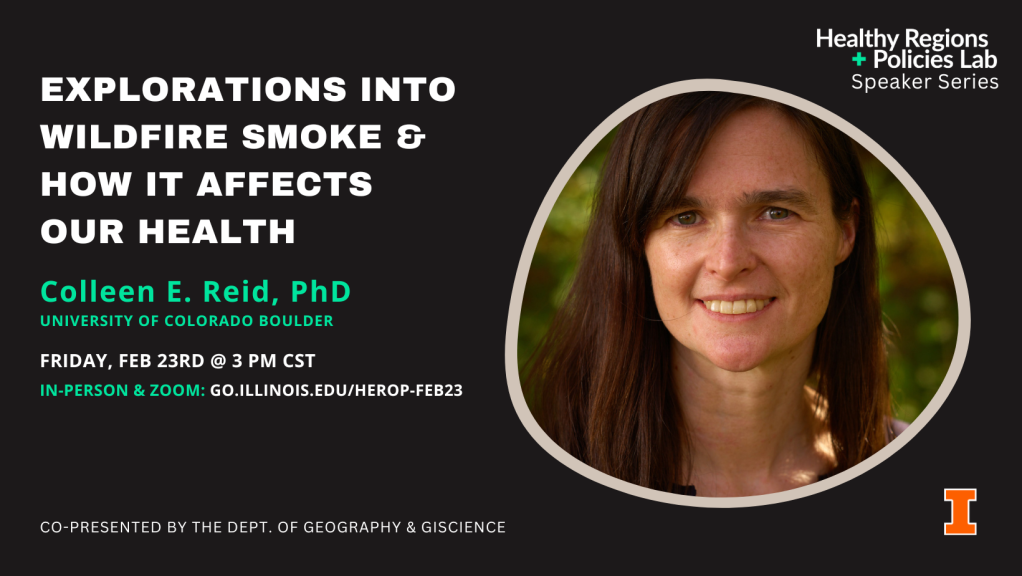Wildfire Smoke & How it Affects our Health
Colleen E. Reid, Ph.D., U of Colorado Boulder
Friday, Feb 23rd @ 3 PM CST,
via Zoom & In-Person at NHB 2049 in Urbana, IL

Join us for snacks, learning, and conversation at the next installment of the HEROP Speaker Series on Friday, Februart 23rd at 3 PM. Coffee and networking session to follow. For folks outside of the UIUC community, please join us via Zoom!
Wildfires have been increasing in frequency and duration in the western U.S. and the wildfire season has been increasing in length such that many regions now claim that there is no wildfire season anymore but that wildfires have become a year-round threat. Wildfire smoke is a growing contributor to the fine particulate air pollution (PM2.5) that we are exposed to in the US. Wildfire air pollution no longer affects just the western US but increasingly the Midwest and East Coast. Investigating the health impacts of wildfire smoke are challenging due to lack of sufficient air pollution monitoring across space, the complexity of the components of wildfire smoke that could affect human health, the numerous health outcomes that have been found to be linked to wildfire smoke, and more. While the U.S. has been successful at decreasing PM2.5 from industrial sources and vehicle emissions under the Clean Air Act, we cannot control wildfire smoke in the ways that we do point and mobile emissions sources. In her talk, Dr. Reid will dive into her research that investigates how to better assess population exposure to wildfire smoke, how it impacts human health, and which communities are more affected by wildfire smoke. She will also provide a glimpse into her ongoing work to understand the health tradeoffs of interventions to protect health from wildfire smoke.
Presenter
Dr. Colleen E. Reid
Colleen E. Reid, Ph.D., studies how environmental and social exposures interact to influence health with a particular focus on exposures caused by global climatic changes and society’s responses to those changes. To date, her research has focused on the health impacts of exposure to air pollution from wildfires, extreme heat events, and proximity to urban vegetation. Her current research projects include a study investigating how wildfire smoke affects air quality and health of children in schools and at home, looking into the health and air quality impacts of the Marshall Fire, and trying to understand whether proximity to green space or people’s perceptions of green space matter more in affecting their mental health. Dr. Reid completed her Ph.D. in Environmental Health Sciences at the University of California, Berkeley in 2014, a Master of Public Health in 2007 from the University of California Berkeley, and a Bachelor of Science from Brown University in 2000.
In-Person or Virtual?
The in-person RSVP option is open to the University of Illinois community (students, staff, and faculty).
A virtual option via Zoom is available for the public. To register for the Zoom option, please access the following link: go.illinois.edu/HEROP-Zoom-FEB23.
About the Series
The HEROP Speaker Series connects scholars, experts, and innovative thinkers to discuss different conceptual, methodological, and technological facets of public health to better understand the social determinants of health, and how place may influence outcomes. The Healthy Regions & Policies (HEROP) Lab integrates innovative GIScience, public health, and statistical approaches to explore, understand, and promote healthy places. We’re experts in the spatial & social determinants of health. We’re based out of the Dept of Geography & GIScience at the University of Illinois at Urbana-Champaign.

Leave a comment